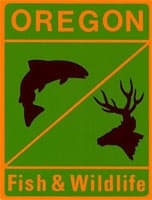Oregon Fish and Wildlife Commission Approves Conservation Plan for Rogue Fall Chinook
OutdoorHub 01.13.13

The Oregon Fish and Wildlife Commission today adopted a Conservation Plan designed to maintain and enhance fall chinook populations in the Rogue Management Unit in southwest Oregon.
The Conservation Plan is called for under the ODFW Native Fish Conservation Policy and covers five independent Rogue populations including the Upper, Middle and Lower Rogue, Applegate and Illinois rivers, and for a separate coastal stratum comprised of the Chetco, Winchuck, and Pistol rivers and Hunter Creek.
Unlike many other salmon and steelhead restoration and conservation plans, the Rogue fall chinook plan starts with relatively healthy populations of fish. Current fall chinook populations in the Rogue appear to be even more robust than they were historically.
Under the alternative adopted by the Commission, some of the primary management tools for maintaining and enhancing populations include habitat enhancement and a reduction in non- native fish introductions. Management emphasis will be on enhancing wild fish populations while maintaining current fishing opportunities as much as possible.
The Commission also adopted the schedule of damages to be used in assessing commercial fishing violations during 2013. Each year, the Commission establishes the average market value per pound for each species of food fish. These values are used to set damages in lawsuits associated with the unlawful taking of food fish. The values are based on the average prices during the previous year as reported by Oregon commercial fish dealers.
The Commission approved two land acquisitions at two Willamette Valley wildlife areas. The acquisitions will add 100 acres to the Sauvie Island Wildlife Area near Portland and 310 acres to Fern Ridge Wildlife Area near Eugene. Funding will come from the 2010 Willamette Wildlife Mitigation Agreement between BPA and ODFW that dedicates funds for wildlife habitat mitigation in the Willamette Valley.
The Commission also approved three amendments to the 2013 Big Game Regulations, one of which clarifies that hunters who don’t report by the specified deadline for deer and elk tags, while required to pay a $25 penalty fee, will not be required to complete a late report.
Finally, the Commission amended its upcoming meeting schedule including cancellation of the February meeting in Salem due to a lack of agenda items. The next Commission meeting will be March 8 in Salem. A complete list of upcoming meetings dates and locations can be found at http://www.dfw.state.or.us/agency/commission/minutes/
The Commission is the policy-making body for fish and wildlife issues in the state.

